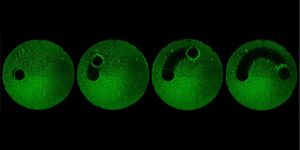Fourth-Generation Rapid Diagnostic Tests for Acute HIV-1 Infections
The ability to diagnose an acute HIV-1 infection before there are detectable antibodies to HIV 1/2 is critical to making an early diagnosis and getting the individual into treatment. Approximately 5-20% of all HIV infections come from recently infected patients making early detection a vital part of the control of an epidemic in a community or demographic area. Early detection through laboratory testing requires the presence of HIV antigen (HIV-1 p24 antigen) or nucleic acids in the blood. There are currently rapid fourth-generation point-of-care diagnostic tests approved for a variety of clinical settings that detect both antibodies to HIV 1/2 and HIV-1 p24 antigenemia. However, the sensitivity (the ability of the test to identify a patient with the disease) for these tests varies ranging from 2-92%. J. M. Lewis and colleagues, concerned that such a wide range in sensitivity may result in substandard accuracy leading to false negatives/positives, performed a systematic review to evaluate the accuracy of these tests being used in the field.
The inclusion criteria included studies that evaluated the "field performance of at least one fourth-generation RDT for acute HIV-1 in adults (aged>15 years)," and they allowed cross-sectional studies, cohort studies, and randomized control trials in the literature search. Out of the 2,056 studies, four met the criteria with a total of 17,381 participants. The index laboratory test evaluated in all four studies was the Alere Determine HIV-1/2 Ag/Ab Combo (Alere Medical Co.Ltd., Chiba, Japan), which is a fourth-generation rapid diagnostic test that detects both HIV 1/2 antibodies and the HIV-1 p24 antigen.
The review revealed that the index test didn't accurately detect any true positive specimens for acute infection in the 17,381 participants, even though they were from high-risk areas including Sub-Saharan Africa, Australia, and the U.K. 26 known acute infections were missed and 35 false positives. "Based on these results and poor sensitivity of this test, we recommend that this test not be used for point-of-care testing for acute HIV-1 testing," stated Lewis.
The authors concluded that fourth-generation tests are unreliable, and testing should be limited to third-generation tests, which detect HIV-1/2 antibodies only. This study was limited by evaluating only one test, but there are other kits available including: "SD Bioline HIV Ag/Ab (Standard Diagnostics, Inc., Giheung-gu, Republic of Korea) and ImmunoComb II HIV 1&2 TriSpot Ag-Ab (Orgenics Ltd, Yavne, Israel." Even though they were unable to generalize their results to other fourth-generation tests, they predict that the other tests available will have the same problems and for clinicians to interpret results with caution.








